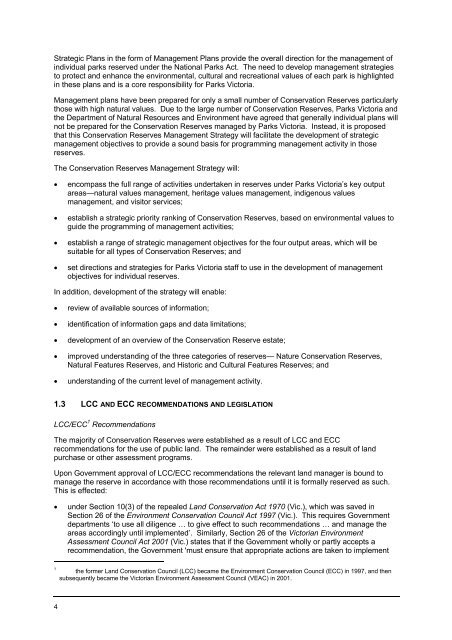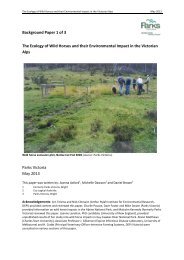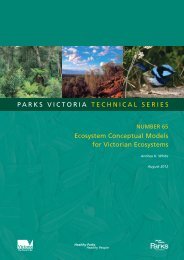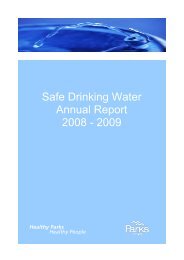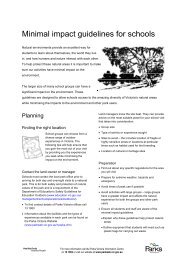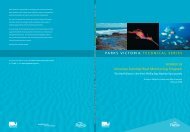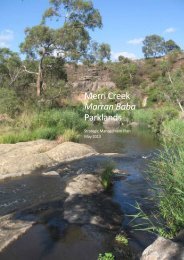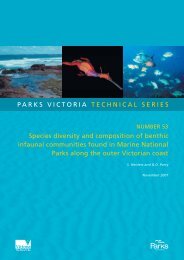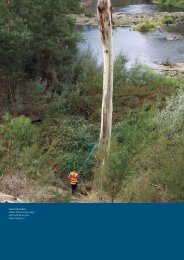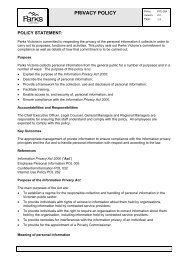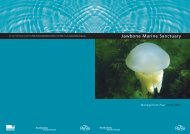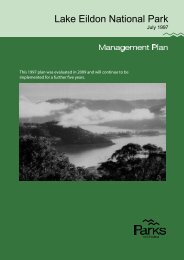Conservation Reserves Management Strategy 2003 - Parks Victoria
Conservation Reserves Management Strategy 2003 - Parks Victoria
Conservation Reserves Management Strategy 2003 - Parks Victoria
You also want an ePaper? Increase the reach of your titles
YUMPU automatically turns print PDFs into web optimized ePapers that Google loves.
Strategic Plans in the form of <strong>Management</strong> Plans provide the overall direction for the management ofindividual parks reserved under the National <strong>Parks</strong> Act. The need to develop management strategiesto protect and enhance the environmental, cultural and recreational values of each park is highlightedin these plans and is a core responsibility for <strong>Parks</strong> <strong>Victoria</strong>.<strong>Management</strong> plans have been prepared for only a small number of <strong>Conservation</strong> <strong>Reserves</strong> particularlythose with high natural values. Due to the large number of <strong>Conservation</strong> <strong>Reserves</strong>, <strong>Parks</strong> <strong>Victoria</strong> andthe Department of Natural Resources and Environment have agreed that generally individual plans willnot be prepared for the <strong>Conservation</strong> <strong>Reserves</strong> managed by <strong>Parks</strong> <strong>Victoria</strong>. Instead, it is proposedthat this <strong>Conservation</strong> <strong>Reserves</strong> <strong>Management</strong> <strong>Strategy</strong> will facilitate the development of strategicmanagement objectives to provide a sound basis for programming management activity in thosereserves.The <strong>Conservation</strong> <strong>Reserves</strong> <strong>Management</strong> <strong>Strategy</strong> will:• encompass the full range of activities undertaken in reserves under <strong>Parks</strong> <strong>Victoria</strong>’s key outputareas—natural values management, heritage values management, indigenous valuesmanagement, and visitor services;• establish a strategic priority ranking of <strong>Conservation</strong> <strong>Reserves</strong>, based on environmental values toguide the programming of management activities;• establish a range of strategic management objectives for the four output areas, which will besuitable for all types of <strong>Conservation</strong> <strong>Reserves</strong>; and• set directions and strategies for <strong>Parks</strong> <strong>Victoria</strong> staff to use in the development of managementobjectives for individual reserves.In addition, development of the strategy will enable:• review of available sources of information;• identification of information gaps and data limitations;• development of an overview of the <strong>Conservation</strong> Reserve estate;• improved understanding of the three categories of reserves— Nature <strong>Conservation</strong> <strong>Reserves</strong>,Natural Features <strong>Reserves</strong>, and Historic and Cultural Features <strong>Reserves</strong>; and• understanding of the current level of management activity.1.3 LCC AND ECC RECOMMENDATIONS AND LEGISLATIONLCC/ECC 1 RecommendationsThe majority of <strong>Conservation</strong> <strong>Reserves</strong> were established as a result of LCC and ECCrecommendations for the use of public land. The remainder were established as a result of landpurchase or other assessment programs.Upon Government approval of LCC/ECC recommendations the relevant land manager is bound tomanage the reserve in accordance with those recommendations until it is formally reserved as such.This is effected:• under Section 10(3) of the repealed Land <strong>Conservation</strong> Act 1970 (Vic.), which was saved inSection 26 of the Environment <strong>Conservation</strong> Council Act 1997 (Vic.). This requires Governmentdepartments ‘to use all diligence … to give effect to such recommendations … and manage theareas accordingly until implemented’. Similarly, Section 26 of the <strong>Victoria</strong>n EnvironmentAssessment Council Act 2001 (Vic.) states that if the Government wholly or partly accepts arecommendation, the Government 'must ensure that appropriate actions are taken to implement1the former Land <strong>Conservation</strong> Council (LCC) became the Environment <strong>Conservation</strong> Council (ECC) in 1997, and thensubsequently became the <strong>Victoria</strong>n Environment Assessment Council (VEAC) in 2001.4


